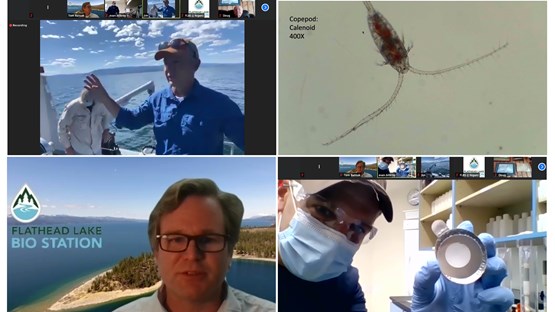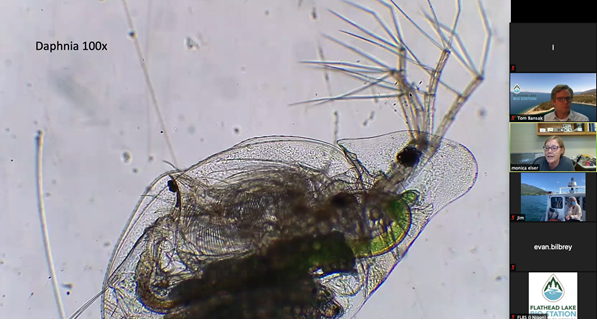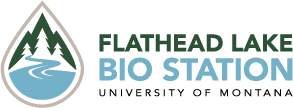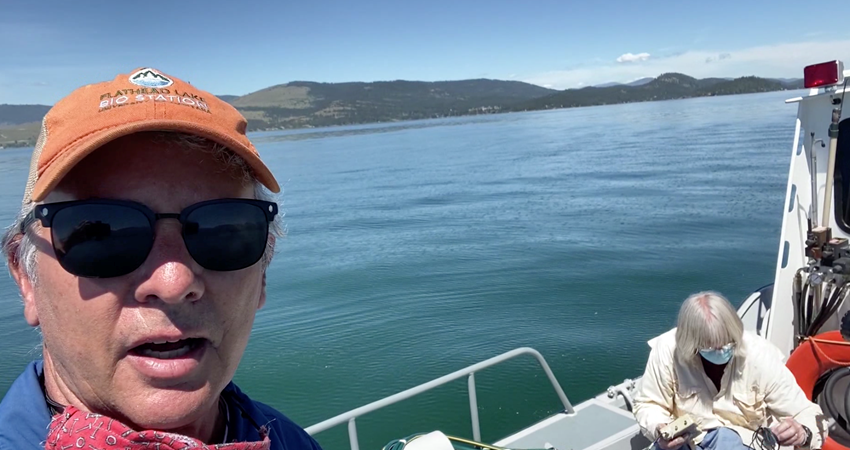Bio Station Hosts Virtual Research Cruise
by Kelsea Harris-Capuano, 2020 Ted Smith Environmental Storytelling Intern
“Let's go try to find some Mysis,” Jim Elser said as the Flathead Lake Biological Station’s research vessel, the Jessie B., headed out of Yellow Bay.
Elser, the Bio Station Director and Jim Craft, researcher and limnologist, didn’t catch any Mysis (an invasive shrimp that has been established in Flathead Lake since the 1980s), but that didn’t stop them from successfully broadcasting live a virtual research cruise event that allowed the public to join in on Bio Station activities, learn about the lake and have some fun.
For the past seven years the Flathead Lake Biological Station (FLBS) has been putting on a mid-summer research cruise event for the public, so participants can learn about the lake and FLBS, and enjoy appetizers, beverages, music and being out on the water.
The usual mid-summer event, which is conducted on the Far West with generous help from Flathead Lake Boat Tours was scheduled for July 14th 2020, but was cancelled due to COVID-19 health and safety concerns.
The event brings together the public with FLBS scientists who share information about the Bio Station, give talks on Flathead Lake ecology, the FLBS Research and Monitoring Program, and give the public an opportunity to ask questions.
Elser said the cruise allows for one-on-one time between Bio Station personnel and participants which is hard to replace in a virtual environment. The in-person event is ticketed with a cap at about 100 participants. The event has sold out and had a waiting list almost every year. Revenue from the cruise goes towards the FLBS Research and Monitoring Program.
The virtual version, streamed on the original scheduled date and time, was a little different and required a choreographed effort of about 10 Bio Station team members to pull off successfully.
“I want to welcome you to the first ever virtual research cruise. We’re going to showcase the things we do out here on Flathead to keep track of what’s happening in our amazing and beloved lake,” Elser said as the cruise got underway.

The Virtual Bio Station Research Cruise consisted of four live and interactive video streaming stations, including one in the Freshwater Research Lab and one aboard the Jessie B.
Broadcast via Zoom, Elser and Craft took the research vessel out on the water with Elser’s iPhone set up on a tripod. With Elser narrating, Craft demonstrated the different equipment used to take samples and measure physical characteristics of the lake like water clarity, light attenuation and temperature.
In between sampling demonstrations, the feed switched over to Tom Bansak, FLBS Associate Director and onshore host as he discussed the history of Flathead Lake, the Bio Station and its research and monitoring activities.
It then cut to Adam Baumann, manager of the Bio Station’s Freshwater Research Lab, demonstrating what happens when samples are brought back to the lab to be analyzed.
Monica Elser, the FLBS education liaison, presented up close images of the phyto- and zooplankton, the microscopic life that are the foundation of the Flathead Lake food web.
The images came from a projecting microscope, a microscope with a built-in camera. This was key to easily incorporate Flathead Lake’s tiny inhabitants into the virtual experience. Normally on the cruise a sample is taken from the lake and participants get to check out the live plankton under a microscope while on the Far West.
The virtual cruise inspired Monica in her planning for other Bio Station activities like virtual field trips she’s been working on for the FLBS K-12 education program. Monica is hoping to create short videos including content from the virtual research cruise to put on YouTube as resources for teachers to use.

FLBS Education Liaison Monica Elser presents a series of high-resolution images of Flathead Lake's microorganisms during the Research Cruise.
Participants on the virtual cruise were also able to ask questions via Zoom chat, fielded by the presenters along the way.
Behind the scenes was Jeremy Nigon, FLBS IT guru, making sure Zoom was running smoothly, and Ian Withrow, who put together video clips in advance in case the live feed went down.
Withrow, who heads up FLBS media and communications, edited video content as a back-up plan. He’s glad they didn’t have to use them and thought the virtual cruise went well and was engaging.
“The people that went to the [virtual] cruise got a much more intimate look at the monitoring program than they would on the actual cruise,” he said.
The time and effort Withrow put into creating back-up video content isn’t going to waste. The behind-the-scenes look into how science is done on Flathead Lake has utility for other projects, such as the educational videos Monica is planning.
The Bio Station has been developing more opportunities to teach and engage while the world tunes in virtually. This includes virtual field trip, Aquatic Invasive Species curricula and the Data and Donuts seminar series that was switched this year to an online venue, recorded and posted on the FLBS website for future viewing.
Bansak, who had concerns about the event’s success due to the number of technological moving parts and the difficulty of engaging an audience virtually, was very pleased with the outcome.
Most of the technological kinks were worked out during a two-hour dry run the week before, and Bansak was happy about the number of people who showed up, asked engaging questions via Zoom chat, and shared encouraging comments and thank-you’s.
“All those pieces are heartening, showing that it was valuable, both to the community and to us in terms of being a communication tool,” he said.
Elser capped off the virtual performance with a leap from the roof of the Jessie B. splashing into the clear clean waters of Flathead Lake.
While the virtual experience didn’t have the glamor of hors d'oeuvres, beverages and music on a boat on the lake, it did see a good showing with more than 50 participants joining. That number dwindled a little over the course of the hour and half event.
Lysbeth Anderson, who was one of those participants, sits on the Bio Station advisory board has attended nearly all of the Bio Station’s research cruise events in previous summers.
Anderson said she really enjoyed the virtual version describing it as the best one yet.
“The educational quality was super, and we really appreciated that,” she said.


